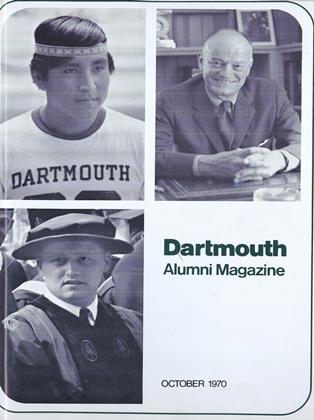Henry McCune Dargan, Willard Professor of Rhetoric and Oratory, Emeritus, died in his sleep August 13, 1970, at the Home for Old Men and Aged Couples, 1060 Amsterdam Ave., New York City, after long illness. He was born July 10, 1889, in Charleston, S. C., the younger of two sons of the Rev. Edwin C. Dargan. His elder brother was E. Preston Dargan, Professor of French Literature in the University of Chicago before his death in 1940.
Henry was graduated A.B. at Mercer University in 1910, A.M. at Harvard in 1912, Ph.D. at Harvard in 1914. He taught English at the University of North Carolina from 1914 to 1923, and came to Dartmouth as a full professor of English in 1923. He was appointed Willard Professor in 1946 and emeritus in 1957 on his retirement. He lived in midtown New York City from 1957 to 1965, at first in a hotel, until ill health forced him to live at the Home. He was a bachelor and is survived only by his brother’s widow and her three daughters.
At Dartmouth he taught courses in the eighteenth century and English Honors, besides Freshman English. He served as Chairman of the Department 1929-1932 and 1938-1939. The earlier of these terms was especially important because the English Department, which had been dispersed among three buildings of the White Row, moved into Sanborn House in November 1929. Suddenly it acquired the personal cohesion hitherto lacking as well as respon- sibility for a lot of property. Henry drew up a constitution which distributed duties among department officers and committees and was remarkable among written constitu- tions in that it never became a strait) acket.
This early instance of the authority Henry Dargan established in the Department and indeed in the College was based on his tremendous learning, the vivacity of his mind, his eloquence, his humor, and his moral sensitivity. He served as Chairman of Humanities, on numerous college commit- tees, always with distinction. But through all his responsibilities he kept one duty fore- most: to the student. He was a teacher by nature, and probably happiest when teach- ing.
Yet he restricted himself in many ways. Though a gifted administrator, he never sought power; though he was very good company, he clearly preferred solitude. He rarely talked politics; he refused all things connected with religion. Though as brilliant a writer as he was a speaker, he made little effort to publish. In his rather rare appearances before the Ticknor Club, the organ of scholars in Humanities, he would inform and delight his colleagues with work done as carefully and learnedly as for publication, but it would not appear in print. He wrote two savage essays against the partisans of the Earl of Oxford as author of Shakespeare’s works, and whoever heard them will always remember them but he will never read them. He discussed detective fiction before the Ticknor Club in a most lively paper, but it has vanished.
He loved literature and education conta- giously, and little else. After he retired, he went to the New York Public Library to study in the mornings and to movies or plays Jater in the day. He was proud of his appointment to the Willard chair, both because it echoed the oldest named chair in the country, the Boylston Professorship at Harvard, and because it had had such a curious place in Dartmouth’s academic politics. When he died, he left instructions that there should be no funeral, no memorial service, and that his ashes should be spread in a desert place. His relatives insisted on a memorial service in the Home, and one was performed on August 24. But if he were telling those who knew him that he wished to be forgotten, it is a wish we cannot grant.
Prof. Henry McCune Dargan ’23h
 View Full Issue
View Full Issue
More From This Issue
-
 Cover Story
Cover StoryLiberating the Ph.D.
October 1970 By Robert B. Graham ’40 -
 Feature
FeatureEleazar Is Outdone
October 1970 By Charles Jay Kershner -
 Feature
FeatureThe Dickeys Get Resettled
October 1970 -
 Article
ArticleDear Mr. Cunningham . . .
October 1970 -
 Article
ArticleFaculty
October 1970 By William R. Meyer -
 Sports
SportsBig Green Teams
October 1970 By Jack DeGange
Article
-
 Article
ArticleNEW PRIZE OFFERED
April, 1914 -
 Article
ArticleMusical Clubs Trip
April 1936 -
 Article
ArticleFinal Section of "Great Issues"
May 1948 -
 Article
ArticleMy Dog Likes It Here
MAY 1978 By COREY FORD -
 Article
ArticleEnglish Professor William Spengemann:
October 1992 By Karen Endicott -
 Article
ArticleAbout 25 Years Ago
April 1937 By Warde Wilkins '13


